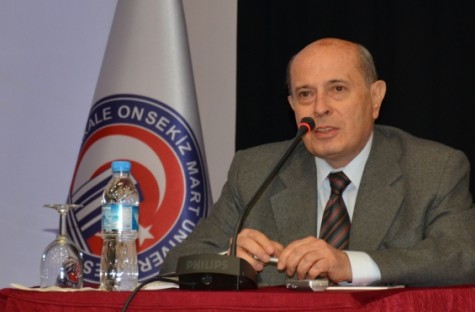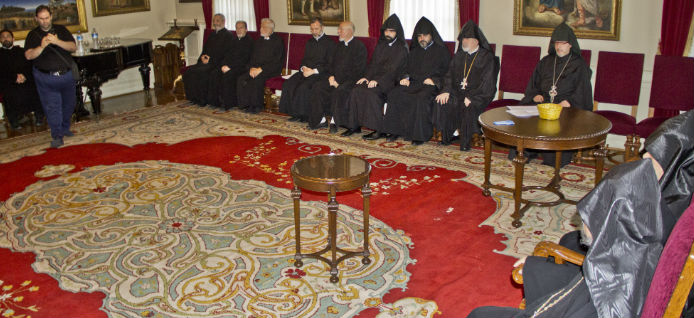Ömer Engin LÜTEM
3 April 2015
On 29 January 2015, President of Armenia Serzh Sargsyan issued a document titled “Pan-Armenian Declaration on the Centennial of the Armenian Genocide”.
As can be gathered from the title of the document, the document is of interest to all Armenians in regard to the genocide allegations and it has the character of guide that instructs on how behave when it comes to this issue. On the other hand, the fact that the document has been issued by the Armenian President gives it an official status, or to say it in another way, makes it a document to which the state is obligated to comply with.
Since a comprehensive comment on the Declaration has been issued by AVIM Specialist Dr. Turgut Kerem Tuncel and which has been published on the AVIM Bulletin, we will not mention the contents of the Declaration. However, it will suffice to indicate that this document turns the genocide allegations into one of the most crucial foreign policy problems of Armenia. This document makes it even more difficult to have reconciliation and agreement between Turkey and Armenia, and for this reason it will postpone even further the normalization of relations.
The foremost objection to this document has come from Levon Ter Petrosyan, the first President of Armenia (1991-1998) and still the leader of the opposition Armenian National Congress.
Regarding the Declaration, Petrosyan stated that Armenia should work to achieve international recognition for the so-called genocide, but that this issue should not be the cornerstone of the country’s foreign policy. He continued by stating that genocide recognition should be handled as a human rights issue, and that the government of Armenia should not demand Turkey to recognize the so-called Genocide and face its own history, being that it is an internal matter for Turkey. With regards to Turkey’s EU accession, Petrosyan defended the idea that European countries should not make the recognition of the so-called genocide a prerequisite for Turkey’s European Union membership. According to Petrosyan, restoration of property that was lost by Armenians due to the Resettlement and compensation to be paid to the descendants for the material losses suffered by their forbearers may be demanded from Turkey. Additionally, Petrosyan recommended the establishment of diplomatic relations between Turkey and Armenia based on the Protocols signed on 10 October 2009 and for cooperation in economic, cultural, and political fields. Having said all of this however, indicating that no political problem in the world has so far been resolved by a committee of historians, Petrosyan objected to the committee of historians that was to be established according to the protocols.
The opinions of the first President of Armenia still do not match the policy adopted in Armenia towards Turkey. In fact, he was criticized for his statements, and meanwhile, the spokesperson of the ruling Republican Party and the Deputy Speaker of the National Assembly, Eduard Sharmazanov, accused him of wanting to bury the Armenian Cause.
At a closer look, it can be seen that Petrosyan still maintains the opinions regarding relations with Turkey that he had during his term in presidency. Even at that time, although he described the 1915 events as ‘genocide’, he did not try to accuse Turkey, nor demand Turkey to recognize this genocide allegation. Although he did not explain the reasons for his stance, during the war period with Azerbaijan, it was commented that he did not find it appropriate to have a serious conflict with Turkey for a non-current topic like genocide allegations, and he tried to prevent further support from Turkey to Azerbaijan. Hereby, we should remind that the Karabakh policy of Ter Petrosyan is much more different than today’s policy. Petrosyan was a supporter of solving this problem as soon as possible, and for this reason, he wanted to accept a plan prepared by Minsk Group, but resigned when the majority of Armenian National Assembly did not support him.
In brief, Ter Petrosyan attempted to dispose problems such as genocide allegations and territories of Azerbaijan including Karabakh occupied by Armenia as soon as possible, and thus provide a new future for his country, but failed to do so.
It will not be possible for suggestions we mentioned above regarding the genocide allegations to have a positive impact in Armenia in the short and even the medium term. It can be understood that the present conflict between two countries will continue for an uncertain time with the negative effects of the April 24th commemorations and other events.
© 2009-2025 Center for Eurasian Studies (AVİM) All Rights Reserved

THE RESOLUTION OF THE EUROPEAN PEOPLE’S PARTY - Ömer Engin LÜTEM
 NATIONAL SCHOOLS IN THE OTTOMAN EMPIRE AND THE RISE OF ARMENIAN INSURGENCY
NATIONAL SCHOOLS IN THE OTTOMAN EMPIRE AND THE RISE OF ARMENIAN INSURGENCY
 CONCERNS OVER THE PATRIARCH ELECTION
CONCERNS OVER THE PATRIARCH ELECTION
 GREEK INDEPENDENCE DAY AND THE PREVAILING DOUBLE STANDARD OF THE WEST
GREEK INDEPENDENCE DAY AND THE PREVAILING DOUBLE STANDARD OF THE WEST




























